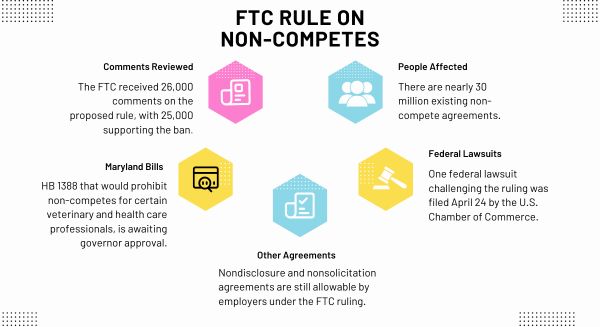

Last week, the Federal Trade Commission (FTC) and U.S. Department of Labor (DOL) each announced major rule changes that, if implemented, will mean big changes for employers.
FTC undercuts non-compete agreements
The FTC’s Non-Compete Clause Rule bans all new non-compete agreements with employees, including those for highly-compensated senior executives. Existing non-compete agreements will remain in force for “senior executives,” but cannot be enforced against any other employee once the FTC Rule takes effect. The FTC Rule also requires employers to notify employees that their existing non-compete clauses are null and void.
When does the FTC Rule take effect? If it survives legal challenge, the FTC Rule will take effect 120 days after it is published in the Federal Register. Accordingly, the Rule will not go into effect until late August—at the earliest.
Who is considered a “senior executive”? The FTC Rule defines senior executives as employees who earn more than $151,164 annually and occupy a “policy-making position.” The FTC estimates that this accounts for less than 1% of employees nationwide.
Are there exceptions? The FTC Rule includes narrow exceptions for (1) non-compete claims that accrue prior to the FTC Rule taking effect and (2) non-compete agreements entered into as part of a sale of a business or resulting from the sale of someone’s ownership interest.
DOL hikes the minimum salary exemption threshold
The DOL’s Overtime Exemption Rule will substantially increase the minimum salary level necessary for most employees to be exempt from the Fair Labor Standard Act’s overtime requirements (certain professions, including physicians and teachers, do not have to meet the minimum salary level). Currently, the minimum salary threshold is $35,568 annually.
When does the DOL Rule take effect and by how much will the minimum salary threshold increase? If the DOL Rule survives legal challenge, the minimum salary will increase to $43,888 on July 1, 2024, and $58,656 on January 1, 2025. Then, beginning on July 1, 2027, the minimum salary will update automatically every three years.
What should companies do now to prepare for the FTC and DOL Rules? Employers should work with counsel and their human resources teams to understand how these regulations will impact their organization and prepare for the rules’ implementation. But employers should keep in mind that legal attacks against both the FTC Rule and DOL Rule have already begun, and so it may be premature to immediately retract existing non-compete agreements or to reclassify or adjust salary rates for employees. In 2016, many employers made changes to their compensation practices in response to an earlier version of the DOL Rule; however, that rule was struck down by the courts mere days before it was scheduled to take effect.
Please reach out to our employment attorneys with any questions.